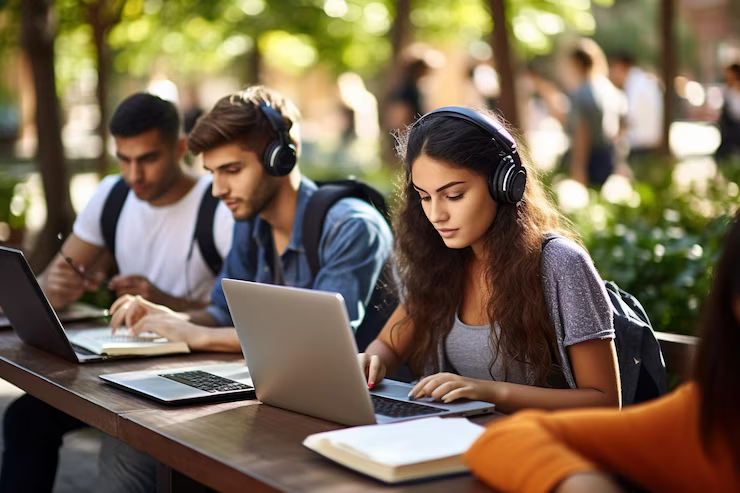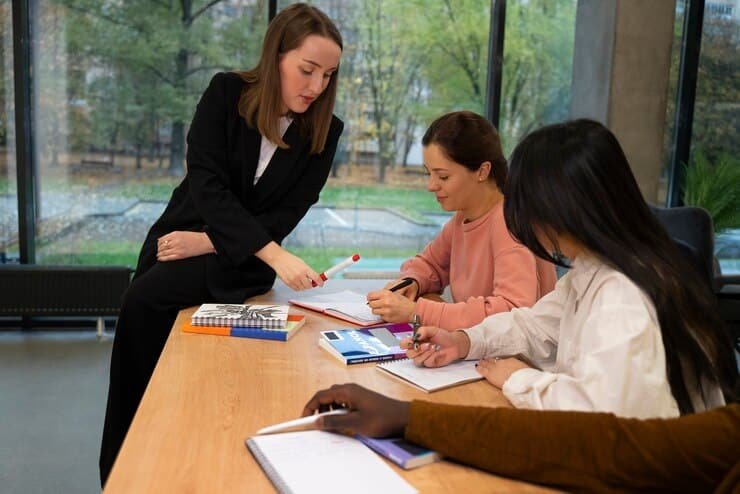In today’s changing world, university libraries are key to student success. With college costs rising and the value of a degree under the spotlight, libraries offer vital resources and support. These can greatly improve the learning experience and help students get the most from college.
Libraries have changed from just storing books to being places of learning, teamwork, and growth. They provide many academic tools, services, and programs. These help students do well in school, gain important skills, and find their way to success.
Key Takeaways
- University libraries give students access to a huge collection of academic materials like books, journals, and databases. This helps them do deep research and learn more.
- Libraries offer services like research help, teaching how to find information, and borrowing between libraries. These help students in their studies.
- Libraries create a community feeling by hosting events, workshops, and places to work together. This helps students meet others, grow personally, and network.
- Libraries work with other campus services to give students all the help they need to do well in school and life.
- University libraries are key in making education affordable and accessible. They offer free learning resources, tech to borrow, and job chances for students.
Fostering a Sense of Belonging and Community
At the university library, students find a welcoming space that builds a strong sense of belonging. Libraries are key in making a place where everyone feels valued, no matter their identity or background.
Events, Programs, and Job Opportunities
The library hosts many events and programs for students. These include author talks, career fairs, and meetups for clubs. It’s a place where students can connect and build community.
Libraries like those at Rice University, University of North Texas, and the University of San Diego also have special resources for first-generation students. They make sure these students feel supported and empowered.
Partnerships with Student Support Centers
Libraries work closely with student support centers on campus. This includes the First Generation Center, Multicultural Center, and others. These partnerships help the library offer resources and events for different student groups.
For example, the University of Utah’s Library has spaces and programs for student veterans. James Madison University even made a card game to help transfer students get settled.
The library’s welcoming and inclusive vibe makes it a place where students feel they belong. This is key for doing well in school and feeling good about themselves.
Also Read :Can Natural Remedies Help With Flu Symptoms?
Centralizing Academic Support Services

Universities have many resources to help students succeed, but not all use them. The Center for First Generation Student Success found that first-generation students use advising and support services less than others. Libraries can make these services easy to find and use.
Libraries now offer workshops, office hours, and programs for students’ needs. They might have special areas for career help, coaching, tutoring, and writing support. This setup helps students feel okay about getting help and supports their growth.
For instance, Kenyon College‘s library has a career development office inside. The University of Virginia‘s Clemons Library has a student advising center. Putting these services together can make students more likely to use them and feel part of the campus community.
| Service | Description | Benefit to Students |
|---|---|---|
| Advising | Academic advising to help students plan their coursework and stay on track | Improved retention, time-to-degree, and success |
| Career Coaching | Guidance on career exploration, job search, and professional development | Increased career readiness and employability |
| Tutoring | Subject-specific and skills-based tutoring to support academic achievement | Enhanced learning outcomes and confidence |
| Writing Support | Assistance with research, writing, and presentation skills | Improved communication and critical thinking abilities |
| Data Analysis | Help with data visualization, interpretation, and statistical analysis | Strengthened quantitative and analytical skills |
| Accessibility Services | Support for students with disabilities and accommodations | Inclusive and equitable learning experiences |
By putting these services in the library, universities make it easy for students to get help. This helps students do well in school and their careers.
Also Read :What Courses Does Purdue University Offer?
Supporting Student Projects and Hands-On Learning

University libraries are changing from just places for books to centers for hands-on learning. Students now work on projects like making presentations, videos, apps, and prototypes. Libraries are getting better at giving students the tools and advice they need to make their ideas real.
Maker Spaces, Labs, and Multimedia Resources
Many university libraries have modern maker spaces, data analysis centers, motion capture labs, and multimedia studios. These places let students learn new skills. They can do things like 3D printing, video making, data visualization, and virtual reality.
Service Learning and Community Engagement
- Libraries work with campus offices to link students with local groups and nonprofits.
- Students use what they learn in class for real projects, like making a social media plan for a local group.
- These projects help students gain important skills and feel connected to their community.
By helping students with their projects and giving them access to the latest tools, libraries prepare the next leaders. These leaders will be innovative and care about their communities.
Also Read :What Are Natural Remedies For Chickenpox Relief?
Building Critical Skills for Academic and Career Success

University libraries are more than just places for books and journals. They are key spots for students to learn important skills for school and work. By doing projects, going to workshops, and visiting classes at the library, students gain skills that employers want.
Nurturing Digital Literacy and Data Analysis
The American Association of Colleges and Universities (AAC&U) says digital literacy is a top skill employers look for. The need for data analysis and interpretation has also grown a lot, with a 50% increase in job ads from 2017 to 2019. Libraries are leading the way in teaching these skills through special programs and partnerships.
For example, Georgia Tech’s library has classes and events on photography, data analysis, and video editing. This helps students improve their digital skills. The University of Miami’s Learning Commons also offers workshops on managing time, taking notes, using creative software, and analyzing data. These skills help students do well in school and their careers.
| Skill | Importance | Library Initiatives |
|---|---|---|
| Digital Literacy | AAC&U ranks it 5th among most sought-after skills | Georgia Tech library offers classes and events on photography, data analysis, and video editing |
| Data Analysis and Interpretation | Job postings mentioning these skills increased by 50% from 2017 to 2019 | University of Miami’s Learning Commons hosts workshops on data analysis and other academic skills |
By using what university libraries offer, students can get the digital literacy and data analysis skills employers want. This puts them on the path to success in school and their careers.
Also Read :What Are The Symptoms Of Malaria?
Facilitating Undergraduate Research and Faculty Collaboration
University libraries are key in supporting undergraduate research and helping students and faculty work together. These partnerships make learning richer and help the university grow.
Libraries boost undergraduate research by sharing research chances with faculty. They use special programs to connect students with professors ready to work together. This helps build strong bonds and lets students shape their studies.
Libraries also give students the tools they need for research. For example, the Virginia Tech library has a program for advanced research skills. This program gives undergraduates the skills to do important research.
Libraries also offer special places, tools, and data for students and faculty to work together on research projects. At Kennesaw State University library, they give awards for top student research. This encourages more students to do great research.
Libraries help students and faculty work together, which is key for a culture of curiosity and innovation. This approach makes the student experience better and helps the university stand out.
University Library: Promoting Affordability and Accessibility
Today, students at universities come from many backgrounds. Many work, and a lot are first in their family to go to college. About one-third live on very little money. Libraries are changing to help these students by making things more affordable and easy to get to.
Open Educational Resources and Technology Lending
Libraries are big supporters of open educational resources (OER). These resources can make textbooks and course materials cheaper for students. They also lend out technology like laptops and tablets. This helps students do well in school today.
Student Employment and Scholarships
Libraries know that having a job on campus is important. It helps students earn money and learn skills that are useful after graduation. Some libraries, like North Carolina State University, give scholarships to students who really need them.
Libraries are also working to make things easier for students who are first in their family to go to college or who work. They are changing how they help students. By making things more affordable and easy to get to, libraries help students do better in school and make their college experience better.
| Initiative | Description | Example |
|---|---|---|
| Open Educational Resources | Providing access to free or low-cost textbooks and course materials | Oregon State University Library’s OER program |
| Technology Lending | Loaning laptops, tablets, and other digital devices to students | North Carolina State University Library’s technology lending program |
| Student Employment | Offering on-campus jobs that build skills and increase employability | North Carolina State University Library’s student worker scholarship program |
“By promoting affordability and accessibility, libraries can play a vital role in supporting student success and enhancing the overall educational experience.”
Also Read : What Are The Types Of Medical Technology?
Providing Research Assistance and Information Literacy Instruction
The library is key to helping students do well at the university. It’s not just about books and research materials. Librarians give students one-on-one help and teach them how to find information.
Librarians help students find the right topics and teach them how to search for information. They show them how to use databases and e-journals. Plus, they help with citing sources so students don’t get lost in formatting.
To make students better at finding information, libraries have workshops, tutorials, and consultations. These sessions teach students how to use information wisely, check sources, and write research papers well.
| Service | Description |
|---|---|
| Research Assistance | Librarians guide on research topics, suggest search strategies, and help with citation-management software. |
| Information Literacy Instruction | Libraries offer workshops, online tutorials, and consultations to teach students important skills. |
“The library is the heart of the university, and librarians are the guardians of its knowledge.”
Collaborating with Faculty and Developing Relevant Collections
The university library is key in bringing together faculty and librarians. This ensures students get the resources they need for their studies. By working with faculty, librarians at Texas A&M University create assignments and course materials that teach information literacy and research skills.
This teamwork combines different expertise and knowledge. It leads to new ideas and fresh perspectives. Before COVID-19, librarians encouraged instructors to use more online educational resources. During the pandemic, this push grew stronger, as noted by Susan Goodwin, the associate dean for user services at Texas A&M University.
“The COVID-19 pandemic only strengthened our resolve to continue to get the word out about the benefits of using open educational resources and other affordable options for course materials.”
By partnering with faculty, the university library makes sure students have what they need for their assignments and coursework. This teamwork boosts information literacy and builds a strong community feeling in the classroom.
The university library also works hard to build relevant collections for the campus community. By talking with faculty and keeping up with new trends, librarians make sure the library’s resources stay innovative and accessible. This helps students reach their academic and career goals.
Also Read: Study Abroad Purdue Unlock Global Opportunities
Conclusion
Today, academic libraries are key to helping students succeed. They offer many tools, services, and expertise. But, there’s a gap between what librarians think they do and what students know about the library’s help.
To close this gap, libraries must find new ways to connect with students. They need to make the library’s support more visible. This can be done through research help, building relevant collections, working with teachers, and teaching how to find information.
Using outreach, social media, and digital tools like PressReader’s Self-Pub can keep students informed. These efforts help students stay connected to the library’s wide range of services. This way, libraries become essential partners in helping students succeed.
The main goal of the academic library is to help its students. By focusing on student success, libraries can greatly impact education. They give students the tools, resources, and knowledge they need to do well. As education changes, libraries keep being a key part of helping students reach their goals.
FAQs
Q: How can a university library help me succeed?
A: A university library provides access to a wide range of resources such as books, journals, databases, and special collections that can support your research and studies, helping you succeed academically.
Q: What are the library hours?
A: You can find the library hours on the university’s website or by asking the library staff for the most up-to-date information.
Q: Where can I find news about the library?
A: You can find news and updates about the library on the library’s website or by checking out the latest announcements displayed in the library.
Q: How do I search for specific materials in the library catalog?
A: You can search for specific materials in the library catalog by using keywords, titles, authors, or subjects to find relevant books, articles, and other resources.
Q: What are special collections and archives in the library?
A: Special collections and archives are unique and rare materials that are preserved by the library for research purposes, including historical documents, manuscripts, artworks, and more.
Q: Can I access journal articles through the library’s website?
A: Yes, you can access a wide range of journal articles through the library’s online databases and subscriptions, providing you with valuable research resources.
Q: How can I ask a question to the library staff?
A: You can ask questions to the library staff in person at the information desk, via phone, email, or through online chat services available on the library’s website.
Q: Are there any exhibits or events held in the library?
A: The library often hosts exhibits, events, and workshops that showcase special collections, artworks, and research projects, providing opportunities for exploration and discovery.
Source Links
- https://www.libraryjournal.com/story/How-Academic-Libraries-Can-Help-Students-Get-the-Most-Out-of-College-Peer-to-Peer-Review
- https://exlibrisgroup.com/blog/initiatives-for-student-success-the-key-role-of-the-library/
- https://blog.pressreader.com/libraries-institutions/academic-librarians-help-students-succeed-engagement-is-key




